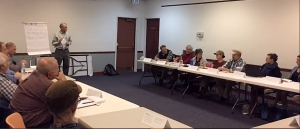By Ned Savage, AmeriCorps VISTA, Local Environmental Agriculture Project (LEAP)
Those of us participating in the Local Environmental Agriculture Project (LEAP), in Roanoke, find the concept of a “food shed” to be helpful when considering our regional food system. A food shed is defined as how food moves between producer and consumer. In the Roanoke region, we have defined our food shed as the cities of Roanoke and Salem and the contiguous counties of Roanoke, Bedford, Botetourt, Craig, Montgomery, Floyd, and Franklin.
Within our regional food system, a number of counties and communities have done food system assessments/studies and food system plans. Many of these studies are helpful in understanding local- and county-level issues, but if we only think in hyper local terms, then we end up with a piecemeal approach to food system planning. Food does not stop at county or city lines and the infrastructure and connections that sustain strong food systems have to cross political lines. In the fall of 2016, LEAP compiled the existing data, research and plans from throughout the region into one consolidated report that identifies common trends, key barriers, and potential opportunities.
The Roanoke Local Regional Food and Agriculture report, while helpful in considering the state of our regional food system, was notable for its lack of one key voice – the farmer’s. While LEAP has long been engaged in providing additional market outlets for local farmers, we wanted to hear directly from producers what barriers, struggles, and challenges they face to running viable farm businesses, and what else our organization could do to support them and their work. And so, in close collaboration with Virginia Cooperative Extension (VCE), we researched other models and designed and held a series of Farmer Listening Sessions.
 In February and March of this year, LEAP hosted a series of three Farmer Listening Sessions in communities surrounding the Roanoke Valley – Bonsack, Rocky Mount, and Christiansburg – with VCE agriculture and natural resources agents serving as facilitators. Attendees identified their greatest challenges to farm viability, and each group then collectively narrowed down the most pressing needs to a list of three, which were discussed in depth. We attempted to boil down the roughly six hours of lively conversation about farm viability into a coherent document, organized by perceived challenges and proposed solution(s) to each obstacle (check out the Farmer Listening Sessions Findings Report and the Executive Summary for more information).
In February and March of this year, LEAP hosted a series of three Farmer Listening Sessions in communities surrounding the Roanoke Valley – Bonsack, Rocky Mount, and Christiansburg – with VCE agriculture and natural resources agents serving as facilitators. Attendees identified their greatest challenges to farm viability, and each group then collectively narrowed down the most pressing needs to a list of three, which were discussed in depth. We attempted to boil down the roughly six hours of lively conversation about farm viability into a coherent document, organized by perceived challenges and proposed solution(s) to each obstacle (check out the Farmer Listening Sessions Findings Report and the Executive Summary for more information).
With such a diverse assembly of farmers contributing to the conversation, it’s no surprise that their perceived needs varied greatly. Even so, many topics surfaced repeatedly: the challenge of marketing their products, the tiny market share enjoyed by local food producers, consumers’ insistence on convenience and low prices above all else, market accessibility, food safety certifications, liability and insurance issues, access to reliable labor, high costs of farm inputs, access to land, access to capital, and policies at the local, state, and national levels that put small producers at a competitive disadvantage were all identified as barriers to farm viability. Many solutions to these issues were posited: collective branding, a Group GAP certification process, workforce development, better communication networks to make farmers aware of existing programs, a farmer cooperative, and advocacy for policy change were all considered. The most consistently touted proposed solutions, however, are the two that we are now actively pursuing: consumer education efforts and food system infrastructure (e.g. a food hub).
Based on these conversations around the need for a more educated base of local food consumers, LEAP has partnered with Virginia Cooperative Extension’s Roanoke office to form a Consumer Education Action Team. Made up of farmers, stakeholders, and motivated “locavores,” the group is working to create a campaign of fun, entertaining, but most importantly educational content that we hope will inform consumers of the true value that local food provides to our community, our economy, our environment, and our health.
Based on the extensive conversations around market accessibility, certifications, liability, and the desire for more wholesale retail outlets, and in partnership with the Roanoke Valley-Allegheny Regional Commission, we have also formed a Food Hub Action Team, which has met a few times to date, and is planning to study the feasibility of food system infrastructure projects like a food hub.
Looking at our food system from a regional perspective, it’s clear we still have a long row to hoe to create a just, healthy, resilient system that works for both producers and consumers. We must take the time and effort to listen, and to be responsive to the needs of the farmers whose labor is at the very foundation of our food system. We’re always working to better understand and address those various needs, and we hope you’ll join us as we work to create a more equitable, responsive local food system.
